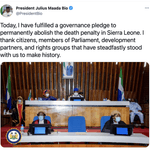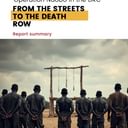
The parliament of Sierra Leone voted unanimously on July 23, 2021 to abolish the death penalty, making the West African nation of 7.8 million people the 23rd country on the continent and the 110th worldwide to end capital punishment.
Pledging to sign the bill into law, President Julius Maada Bio (pictured) said on Twitter, “Today, I have fulfilled a governance pledge to permanently abolish the death penalty in Sierra Leone. I thank citizens, members of Parliament, development partners, and rights groups that have steadfastly stood with us to make history.”
In May, during a United Nations review of Sierra Leone’s human rights record, Bio’s administration publicly announced that it intended to end capital punishment. Deputy Minister of Justice Umaru Napoleon Koroma said at the time that President Bio had made abolition a priority so as to “uphold the fundamental human rights of Sierra Leoneans.”
“Once the legislation goes to parliament and gets approved, that ends the story of the death penalty,” Koroma told the Agence France Presse.
The former British colony’s last executions were in 1998, when 24 military officers convicted of treason for their alleged participation in a coup attempt were put to death. The executions — carried out in the midst of an eleven-year civil war that ended in 2002 and took the lives of 120,000 people — were later found to have violated international human rights treaties and the African Charter on Human and Peoples’ Rights.
Sierra Leone’s 1991 constitution permitted capital punishment for aggravated robbery, murder, treason, and mutiny. The new law, which applies to the 99 prisoners on death row at the time of its enactment, replaces the death penalty with sentences ranging from a 30-year jail term to life imprisonment.

Just as the death penalty in much of the United States is considered a vestige of slavery, lynching, and Jim Crow segregation, it is regarded across the African continent to be a remnant of European colonial laws. Sierra Leone’s death penalty was inherited from the criminal code imposed under British colonial rule. In April 2021, the Malawi Supreme Court of Appeal declared the death penalty in the southeast African nation unconstitutional. Chad abolished the death penalty for all crimes in May 2020. Sierra Leone’s neighboring West African countries of Guinea, Benin, Côte d’Ivoire, Senegal, and Togo also have abolished the death penalty.
In March 2021, the London-based NGO, The Death Penalty Project, and the Sierra Leonean women’s rights group AdvocAid made a formal presentation to President Bio, urging the government to end the death penalty. AdvocAid executive director Rhiannon Davis called the parliament’s action “a huge step forward for this fundamental human right in Sierra Leone.” Abolition, she said, was particularly important for women and girls accused of murdering an abuser. “Previously, the death penalty was mandatory in Sierra Leone, meaning a judge could not take into account any mitigating circumstances, such as gender-based violence,” she told the British newspaper, The Guardian.
“It’s a dream come true in terms of criminal justice, to actually remove such a heinous penalty,” said capital defense lawyer and Sierra Leone Human Rights Commission member Simitie Lavaly.
In 2004, the Sierra Leone Truth & Reconciliation Commission that investigated atrocities committed during the nation’s civil war found that “successive governments abused the death penalty to eliminate political opponents.” It called the continuing existence of the death penalty in Sierra Leone “an affront to a civilised society” and listed its abolition as a human rights “imperative.”
“Here’s a small country in West Africa that had a brutal civil war 20 years ago and they’ve managed to abolish the death penalty,” AdvocAid’s co-founder and former executive director Sabrina Mahtani told the New York Times. “They would actually be an example for you, U.S., rather than it always being the other way around,” she said.
President Julius Maada Bio, Twitter, July 23, 2021; Abdul Rashid Thomas, Sierra Leone has abolished the death penalty, Sierra Leone Telegraph, July 24, 2021; Ruth Maclean, One by One, African Countries Dismantle Colonial-Era Death Penalty Laws, New York Times, July 23, 2021; Saeed Kamali Dehghan, Sierra Leone abolishes death penalty, The Guardian, July 24, 2021; Sierra Leone parliament votes to abolish death penalty, Reuters, July 24, 2021; Sierra Leone parliament approves bill to ban death penalty, Agence France Presse, July 24, 2021; Sierra Leone abolishes the death penalty, Deutsche Welle, July 24, 2021; Sierra Leone government moves to abolish death penalty, Agence France Presse, May 12, 2021; Press Release, Dismantle the gallows! Sierra Leone becomes the latest country to abolish the death penalty, The Death Penalty Project, July 23, 2021.
See also Witness to Truth: Report of the Sierra Leone Truth & Reconciliation Commission, Volume 2, Chapter 2, Findings, at pages 28, 90 – 92, 126 – 27 & 139, and Chapter 3, Recommendations, at page 206 (2004).


